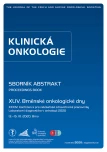-
Medical journals
- Career
Mindfulness in Palliative Care – the Healing Effect of the Present Moment
Authors: Doc. PhDr. Světlák Miroslav, Ph.D.
Authors‘ workplace: Ústav psychologie a psychosomatiky, LF MU, Brno
Published in: Klin Onkol 2020; 33(Supplementum - 2): 138-140
Category: Article
Overview
Palliative care is a multidisciplinary approach that improves the quality of life of patients and their families facing the problem associated with a life-threatening illness, through the prevention and relief of suffering. To help people relieve suffering effectively, the deep understanding of the nature of suffering and its dynamic is a crucial condition for it. The research of the mindfulness-based approaches in oncology and palliative care has repeatedly revealed that mindfulness meditation training is an efficient and feasible tool in helping people with the relief and modulation of suffering associated with cancer. In mindfulness training, we help people to develop an awareness that arises through paying attention, on purpose, in the present moment, non-judgmentally with the aim to convey them a deep inside to the fundamental principles of the mind functioning. This kind of inside brings them freedom in reaction to how they can respond to symptoms. The development of the skill to be in the present moment, with acceptance and non-judgmental manner to whatever arises in our experience represents the fundamental pillar in the background of well-being and mental health. From this point of view, the mindfulness-based programs and interventions should be an integral part of complex oncology and palliative care.
Keywords:
Quality of life – palliative care – mindfulness
Sources
1. Sartre JP. Bytí a nicota: pokus o fenomenologickou ontologii. Praha: OIKOYMENH 2018.
2. Latorraca CD, Martimbianco AL, Pachito DV et al. Mindfulness for palliative care patients. Systematic review. Int J Clin Pract 2017; 71 (12). doi: 10.1111/ijcp.13034.
3. Kabat-Zinn J. Život samá pohroma. Brno: Jan Melvil Publishig 2016.
4. Segal ZV, Williams JM, Teasdale JD. Mindfulness-based cognitive therapy for depression: a new approach to preventing relapse. New York: The Guildford Press 2002.
5. Farb NA, Segal ZV, Mayberg H et al. Attending to the present: mindfulness meditation reveals distinct neural modes of self-reference. Soc Cogn Affect Neurosci 2007; 2 (4): 313–322. doi: 10.1093/scan/nsm030.
6. WHO. Global atlas of palliative care at the end of life. [online]. Available from: https: //www.who.int/cancer/publications/palliative-care-atlas/en/.
7. Světláková L, Sláma O, Světlák M et al. Prevalence of anxiety and depression and th eir impact on the quality of life of cancer patients treated with palliative antineoplasic th erapy – results of the PALINT trial. Klin Onkol 2019; 32 (3) : 201 – 207. doi: 10.14735/ amko2019 201.
8. Shapiro SL, Carlson LE, Astin JA et al. Mechanisms of mindfulness. J Clin Psychol 2006; 62 (3) : 373 – 386. doi: 10.1002/ jclp.20237.
9. Goodman P. The empire city. USA: Random House 1978.
Labels
Paediatric clinical oncology Surgery Clinical oncology
Article was published inClinical Oncology

2020 Issue Supplementum - 2-
All articles in this issue
- Editorial
- I. Onkologická prevence a screening
- III. Pacientské organizace
- IV. Epidemiologie nádorů, klinické registry, zdravotnická informatika
- V. Vzdělávání, kvalita a bezpečnost v onkologické praxi
- VI. Diagnostické metody v onkologii
- VII. Onkochirurgie, rekonstrukční chirurgie
- VIII. Radioterapeutické metody
- IX. Nežádoucí účinky protinádorové léčby
- X. Paliativní péče a symptomatická léčba
- XI. Nutriční podpora v onkologii
- XII. Ošetřovatelská péče a rehabilitace
- XIII. Psychosociální péče
- XIV. Hereditární nádorové syndromy
- XV. Nádory prsu
- XVI. Nádory kůže a maligní melanom
- XVII. Nádory jícnu a žaludku
- XVIII. Nádory tlustého střeva a konečníku
- XIX. Nádory slinivky, jater a žlučových cest
- XX. Nádory skeletu a sarkomy
- XXI. Nádory hlavy a krku
- XXII. Nádory hrudníku, plic, průdušek a pleury
- XXIII. Gynekologická onkologie
- XXIV. Uroonkologie
- XXV. Neuroendokrinní a endokrinní nádory
- XXVI. Nádory nervového systému
- XXVII. Hematoonkologie
- XXVIII. Nádory dětí, adolescentů a mladých dospělých
- XXIX. Vývoj nových léčiv, farmakoekonomika, klinická farmacie v onkologii
- XXX. Základní a aplikovaný výzkum v onkologii
- XXXI. Integrativní přístupy v onkologii
- XXXII. Varia (ostatní, jinde nezařazené příspěvky)
- How to Work with Hope in Patients with Advanced Cancer
- Mindfulness in Palliative Care – the Healing Effect of the Present Moment
- XXXIII. Personalizovaný přístup v onkologii
- Clinical Oncology
- Journal archive
- Current issue
- Online only
- About the journal
Most read in this issue- How to Work with Hope in Patients with Advanced Cancer
- Mindfulness in Palliative Care – the Healing Effect of the Present Moment
- XVIII. Nádory tlustého střeva a konečníku
- XVII. Nádory jícnu a žaludku
Login#ADS_BOTTOM_SCRIPTS#Forgotten passwordEnter the email address that you registered with. We will send you instructions on how to set a new password.
- Career

